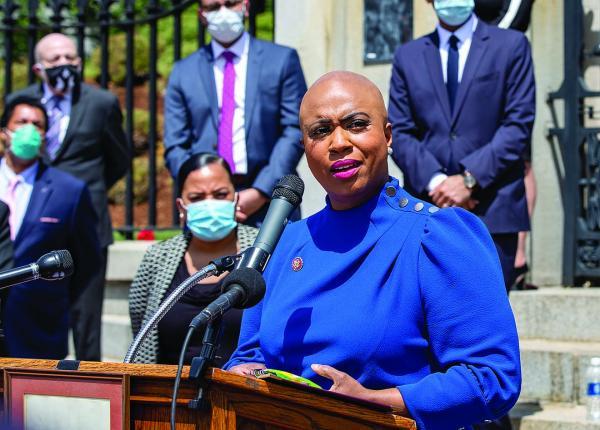January 21, 2021

Congresswoman Ayanna Pressley spoke at a press conference in front of the State House last June. Sam Doran/SHNS photo
US Rep. Ayanna Pressley said today that she is frustrated with the vaccination rollout so far in her congressional district, characterizing it as “delayed and disorganized” and calling for a better-coordinated effort to get the medication to people in city neighborhoods hit hardest by Covid-19.
“How can Massachusetts be ranked 29th in the nation for vaccine distribution when we are a healthcare Mecca and have the infrastructure,” she said in an interview with the Reporter on Thursday, adding, “We’ve got to center equity and prioritize vaccinations in our hardest hit communities. This is about saving lives and I just feel that the vaccine rollout to date, frankly, has been delayed and disorganized.”
Pressley did not specifically point blame city or state officials in her comments. She had been a fierce critic of the Trump administration’s response to the pandemic. On Thursday, she said she expects the Biden-Harris administration to move quickly to improve coordination and distribution of the vaccines.
“I am optimistic,” she said. “I know that President Biden will make an announcement today about a national vaccination strategy. So, hopefully that will also provide support to state local governments to expedite this process. States and municipalities have felt that they were going it alone for a long time, which is why I was always fighting for state and municipal aid.”
Massachusetts is in the first phase of a vaccine plan that began last month with people in long-term care facilities, frontline medical workers and, more recently, first responders. On Thursday, the Baker administration said other groups, among them, dentists, medical and nursing students, and school nurses, will be added to the first phase.
Baker announced the addition at Gillette Stadium, the state’s first mass vaccination site. Fenway Park is slated to open in that capacity on Feb. 1.
Baker said there are currently 150 vaccination sites up and running in Massachusetts and added that he expects "a lot more site infrastructure" in the next ten days to two weeks.
Pressley told the Reporter that she wants to see community health centers in her district play a central role in more widespread vaccinations.
“I represent a district that has the highest representation in the community health centers, certainly in our delegation, and perhaps in the country,” Pressley said, noting: “One in three of my constituents get their care at community health centers. We have the infrastructure. So, yes, I would like to see sites that are based in Roxbury and Dorchester, sites that are accessible [while] recognizing the limits and access based on transit deserts and other things.”
Pressley's own home has been impacted in recent days by the pandemic. Her husband, Conan Harris, tested positive on Jan. 12 and has experienced mild symptoms in the week since.
And she was absent from Wednesday’s inauguration events in Washington because she is quarantining after she and Harris were exposed to mask-less members of Congress while sheltering from the Trump-incited mob that stormed the Capitol Building on Jan. 6. She has been working from her home in Boston since his diagnosis.
Pressley received her first dose of the Pfizer vaccine in December, along with other members of Congress, as part of a “continuity of government” program. She told the Reporter on Thursday that she did so despite her reservations about the vaccine’s safety.
A study released last week by UMass Boston reported that 1 in 5 Bostonians who were part of a research survey conducted last fall responded that they probably would not get vaccinated. The survey also reported that nearly half of Black Bostonians surveyed said they had little or no interest in getting vaccinated, a result the report attributed in part to mistrust sown over a history of abuse by medical science.
Pressley said that such skepticism “is warranted, given the ways in which the medical community violated community trusts through acts of medical apartheid, like the Tuskegee experiment.
“To be transparent,” she added, “I had to overcome my own fear and skepticism. But I did want to do my part to try to engender confidence in reminding people that this vaccine [was] developed by a black woman.”
Pressley said she plans to lend herself to a public awareness campaign aimed at getting more people of color vaccinated.
“This was my fear all along, which is why early on we were just saying we need other resources, so that we'll be able to do the education and then to be able to reach the community to get word out. We knew that there would be that fear and that there would be that skepticism. But, you know, these are the communities that have been hardest hit. This is now the third leading cause of death for most Black Americans nationally.”
“So this is a matter of saving lives. I'm going to continue to use my platform and the weight of my office and my staff to partner with community-based efforts and organizations to help combat that fear and that skepticism,” Pressley said. “And then to continue to push the state for access to the vaccine.”


